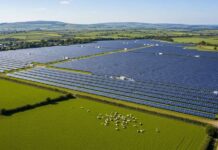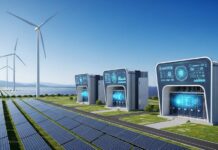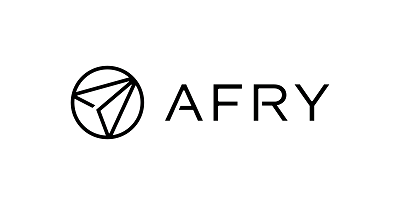In a world where the transition to renewable energy is not just a choice but a necessity for reducing carbon emissions and tackling climate change, the role of electrical grids becomes critically important.
Fredrik Persson is the Global Head of Transmission & Distribution at AFRY, a leading company in engineering and consultancy committed to accelerating the transition towards a sustainable society. With twenty years of hands-on experience and broad expertise in the energy sector spanning power generation, distribution, and storage solutions, Fredrik delves deep into the complexities of modernising electrical grids to ensure a reliable and sustainable energy supply.
Let’s explore Fredrik’s insightful perspective on the integration of renewable sources into our power systems.
As we move towards renewable energy sources, how do you see the role of electrical grids evolving?
The evolution of electrical grids is at the heart of the energy transition. As we pivot from traditional fossil fuels to more renewable sources like wind, solar, and hydroelectric power, grids must become more flexible, smart and resilient. They are no longer just a channel for delivering electricity, electrical networks are becoming dynamic systems that can handle variable energy flows, ensure reliability, and maintain balance between supply and demand in real-time.
What are the main challenges that electrical grids face in integrating renewable energy sources, and how are these challenges being addressed?
One of the foremost challenges is the intermittent nature of renewable energy. Unlike conventional power plants, renewables do not produce a steady output, which can lead to stability issues within the grid. At AFRY, a leader in engineering and consultancy, we recognise the necessity of enhancing grid flexibility to address this challenge. Key to enabling a smooth integration of renewables into the grid are technological advancements, synchronous compensators and storage solutions, coupled with an increase in interconnectivity between regions. This comprehensive approach allows for a more effective balance of the system. Additionally, we believe that capitalising on digitalisation is paramount to enhancing forecasting, monitoring, and control capabilities, ensuring resilient and future-proof solutions in the evolving energy landscape.
How significant is the role of energy storage technologies, such as batteries, in supporting the integration of renewable energy into the grid?
Energy storage technologies are absolutely critical. They act as a buffer, absorbing excess electricity when production outstrips demand and releasing it when the opposite is true. This not only helps in smoothing out the variability of renewable energy but also plays a key role in stabilising the grid and enhancing its flexibility. The advancement and scaling of battery technology, along with other forms of storage like pumped hydro storage, are pivotal for our future energy systems.
Could you shed some light on innovative technologies or approaches being developed to modernise and upgrade electrical grids for the energy transition?
We are witnessing exciting transformative advancements that are reshaping the landscape. Smart grids and digital substations are at the forefront, harnessing the power of IoT and AI to optimise grid operations. These cutting-edge technologies enable better integration of distributed energy resources, real-time data analysis, and predictive maintenance strategies. The result is a significant reduction in downtimes and operational costs, which is crucial for a secure and reliable energy infrastructure. Moreover, advancements in high-voltage direct current (HVDC) transmission technology are proving to be a game-changer. They allow for the efficient long-distance transport of renewable energy, minimising losses and thus, bolstering the potential for cross-border energy sharing. These advancements are already being actualised through landmark projects such as Viking Link, which connects the UK and Denmark, Sued Ost Link transporting energy across Germany, and the Hansa Power Bridge linking Germany and Sweden. AFRY’s involvement in these projects is a demonstration of our expertise and commitment to driving forward innovative solutions to accelerate towards a sustainable energy future.
The importance of compliance with codes and regulations in renewable energy integration is often emphasised. Can you elaborate on why this is crucial?
Requirements for Generators (RFG) is the foundation of a safe, efficient, and reliable energy transition. Adhering to codes and standards ensures that, as we innovate and push boundaries, we do so responsibly. It is about safeguarding the integrity of our power systems, ensuring that every step towards integrating renewable energy enhances the grid’s performance without compromising safety and quality. This commitment to compliance paves the way for sustainable growth, building trust among stakeholders and fostering a regulatory environment that supports innovation and stable growth. It is a testament to our dedication to doing things right, ensuring that as we power forward, we are all moving together towards a cleaner and more sustainable future.
Looking ahead, what is your vision for the future of electrical grids in their ability to support a sustainable, low-carbon energy system?
My vision is an interconnected, flexible and resilient grid infrastructure that serves as the backbone of a global sustainable energy system. This future grid will seamlessly integrate a diverse mix of renewable energy sources and also empower consumers to become active participants through distributed generation and energy management solutions. It is a future where energy is accessible, affordable, and clean for everyone, underpinned by a grid system that is as dynamic and innovative as the society it powers.
About Author
 Fredrik Persson
Fredrik Persson
Head of Transmission and Distribution at AFRY
Fredrik Persson is a senior executive in the energy sector, with 20 years of experience in hydro power, transmission and distribution and renewable energy. He leads AFRY’s transmission and distribution sector, guiding a global team of approximately 400 experts in delivering projects and services for power grids, renewable energy integration, smart grids, and digitalisation. Fredrik has master’s degrees in civil and environmental engineering from Sweden and Austria. His experience includes leading and delivering large-scale infrastructure projects across various markets and regions. He has also been involved in research and development activities, as well as international collaborations, within the hydro power sector. Fredrik is dedicated to fostering innovation and transformation in the energy industry to support the energy transition and achieve global climate goals.

































